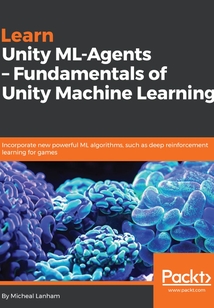首頁 > 計(jì)算機(jī)網(wǎng)絡(luò) >
數(shù)據(jù)庫
> Learn Unity ML-Agents:Fundamentals of Unity Machine Learning最新章節(jié)目錄
舉報(bào) 

會(huì)員
Learn Unity ML-Agents:Fundamentals of Unity Machine Learning
ThisbookisintendedfordeveloperswithaninterestinusingMachinelearningalgorithmstodevelopbettergamesandsimulationswithUnity.ThereaderwillberequiredtohaveaworkingknowledgeofC#andabasicunderstandingofPython.
目錄(116章)
倒序
- 封面
- Title Page
- Copyright and Credits
- Learn Unity ML - Agents - Fundamentals of Unity Machine Learning
- Dedication
- Packt Upsell
- Why subscribe?
- PacktPub.com
- Contributors
- About the author
- About the reviewers
- Packt is searching for authors like you
- Preface
- Who this book is for
- What this book covers
- To get the most out of this book
- Download the example code files
- Download the color images
- Conventions used
- Get in touch
- Reviews
- Introducing Machine Learning and ML-Agents
- Machine Learning
- Training models
- A Machine Learning example
- ML uses in gaming
- ML-Agents
- Running a sample
- Setting the agent Brain
- Creating an environment
- Renaming the scripts
- Academy Agent and Brain
- Setting up the Academy
- Setting up the Agent
- Setting up the Brain
- Exercises
- Summary
- The Bandit and Reinforcement Learning
- Reinforcement Learning
- Configuring the Agent
- Contextual bandits and state
- Building the contextual bandits
- Creating the ContextualDecision script
- Updating the Agent
- Exploration and exploitation
- Making decisions with SimpleDecision
- MDP and the Bellman equation
- Q-Learning and connected agents
- Looking at the Q-Learning ConnectedDecision script
- Exercises
- Summary
- Deep Reinforcement Learning with Python
- Installing Python and tools
- Installation
- Mac/Linux installation
- Windows installation
- Docker installation
- GPU installation
- Testing the install
- ML-Agents external brains
- Running the environment
- Neural network foundations
- But what does it do?
- Deep Q-learning
- Building the deep network
- Training the model
- Exploring the tensor
- Proximal policy optimization
- Implementing PPO
- Understanding training statistics with TensorBoard
- Exercises
- Summary
- Going Deeper with Deep Learning
- Agent training problems
- When training goes wrong
- Fixing sparse rewards
- Fixing the observation of state
- Convolutional neural networks
- Experience replay
- Building on experience
- Partial observability memory and recurrent networks
- Partial observability
- Memory and recurrent networks
- Asynchronous actor – critic training
- Multiple asynchronous agent training
- Exercises
- Summary
- Playing the Game
- Multi-agent environments
- Adversarial self-play
- Using internal brains
- Using trained brains internally
- Decisions and On-Demand Decision Making
- The Bouncing Banana
- Imitation learning
- Setting up a cloning behavior trainer
- Curriculum Learning
- Exercises
- Summary
- Terrarium Revisited – A Multi-Agent Ecosystem
- What was/is Terrarium?
- Building the Agent ecosystem
- Importing Unity assets
- Building the environment
- Basic Terrarium – Plants and Herbivores
- Herbivores to the rescue
- Building the herbivore
- Training the herbivore
- Carnivore: the hunter
- Building the carnivore
- Training the carnivore
- Next steps
- Exercises
- Summary
- Other Books You May Enjoy
- Leave a review - let other readers know what you think 更新時(shí)間:2021-08-13 15:58:44
推薦閱讀
- 數(shù)據(jù)挖掘原理與實(shí)踐
- 有趣的二進(jìn)制:軟件安全與逆向分析
- 算法競(jìng)賽入門經(jīng)典:習(xí)題與解答
- Neural Network Programming with TensorFlow
- 智能數(shù)據(jù)分析:入門、實(shí)戰(zhàn)與平臺(tái)構(gòu)建
- 一個(gè)64位操作系統(tǒng)的設(shè)計(jì)與實(shí)現(xiàn)
- Python金融實(shí)戰(zhàn)
- Apache Kylin權(quán)威指南
- 云數(shù)據(jù)中心網(wǎng)絡(luò)與SDN:技術(shù)架構(gòu)與實(shí)現(xiàn)
- 數(shù)據(jù)分析師養(yǎng)成寶典
- Deep Learning with R for Beginners
- 數(shù)據(jù)指標(biāo)體系:構(gòu)建方法與應(yīng)用實(shí)踐
- Microsoft Dynamics NAV 2015 Professional Reporting
- Rust High Performance
- 標(biāo)簽類目體系:面向業(yè)務(wù)的數(shù)據(jù)資產(chǎn)設(shè)計(jì)方法論
- 從零進(jìn)階!數(shù)據(jù)分析的統(tǒng)計(jì)基礎(chǔ)(第2版)
- 一本書講透數(shù)據(jù)治理:戰(zhàn)略、方法、工具與實(shí)踐
- Learning Game AI Programming with Lua
- 大學(xué)計(jì)算機(jī)基礎(chǔ)習(xí)題與實(shí)驗(yàn)指導(dǎo)(第2版)
- SQL Server從入門到精通(第5版)
- Internet of Things Programming with JavaScript
- Continuous Delivery and DevOps:A Quickstart Guide
- 云存儲(chǔ)安全:大數(shù)據(jù)分析與計(jì)算的基石
- MySQL技術(shù)大全:開發(fā)、優(yōu)化與運(yùn)維實(shí)戰(zhàn)(視頻教學(xué)版)
- Practical Data Analysis Using Jupyter Notebook
- Hadoop大數(shù)據(jù)處理
- Git Essentials(Second Edition)
- 數(shù)據(jù)自助服務(wù)實(shí)踐指南:數(shù)據(jù)開放與洞察提效
- 數(shù)據(jù)庫開發(fā)技術(shù)標(biāo)準(zhǔn)教程
- 數(shù)據(jù)庫技術(shù)及應(yīng)用(Access)實(shí)驗(yàn)指導(dǎo)與習(xí)題集

